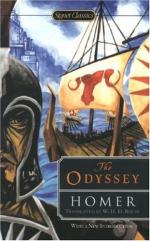He wept as he spoke and every one pitied him. But Medon and the bard Phemius had now woke up, and came to them from the house of Ulysses. Every one was astonished at seeing them, but they stood in the middle of the assembly, and Medon said, “Hear me, men of Ithaca. Ulysses did not do these things against the will of heaven. I myself saw an immortal god take the form of Mentor and stand beside him. This god appeared, now in front of him encouraging him, and now going furiously about the court and attacking the suitors whereon they fell thick on one another.”
On this pale fear laid hold of them, and old Halitherses, son of Mastor, rose to speak, for he was the only man among them who knew both past and future; so he spoke to them plainly and in all honesty, saying,
“Men of Ithaca, it is all your own fault that things have turned out as they have; you would not listen to me, nor yet to Mentor, when we bade you check the folly of your sons who were doing much wrong in the wantonness of their hearts—wasting the substance and dishonouring the wife of a chieftain who they thought would not return. Now, however, let it be as I say, and do as I tell you. Do not go out against Ulysses, or you may find that you have been drawing down evil on your own heads.”
This was what he said, and more than half raised a loud shout, and at once left the assembly. But the rest stayed where they were, for the speech of Halitherses displeased them, and they sided with Eupeithes; they therefore hurried off for their armour, and when they had armed themselves, they met together in front of the city, and Eupeithes led them on in their folly. He thought he was going to avenge the murder of his son, whereas in truth he was never to return, but was himself to perish in his attempt.
Then Minerva said to Jove, “Father, son of Saturn, king of kings, answer me this question—What do you propose to do? Will you set them fighting still further, or will you make peace between them?”
And Jove answered, “My child, why should you ask me? Was it not by your own arrangement that Ulysses came home and took his revenge upon the suitors? Do whatever you like, but I will tell you what I think will be most reasonable arrangement. Now that Ulysses is revenged, let them swear to a solemn covenant, in virtue of which he shall continue to rule, while we cause the others to forgive and forget the massacre of their sons and brothers. Let them then all become friends as heretofore, and let peace and plenty reign.”




